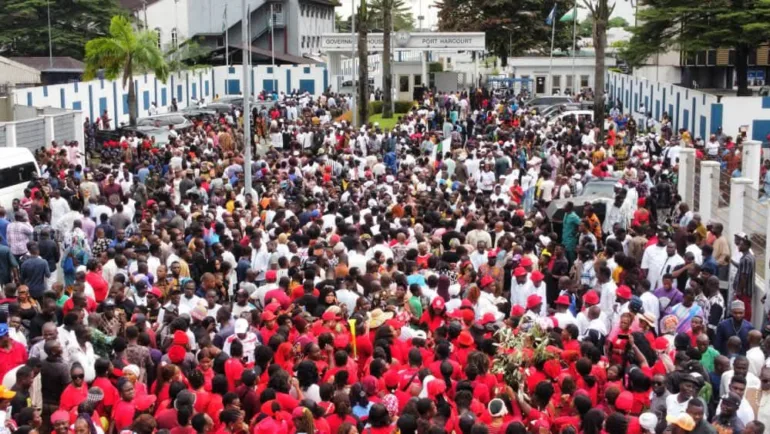Governor Siminalayi Fubara and his deputy, Ngozi Odu, are expected to formally resume leadership of Rivers State today, six months after President Bola Tinubu imposed emergency rule on the state.
An enthusiastic crowd of supporters has gathered at the Government House to welcome the duo back into office. Officials from the state’s emergency services are also on standby.
Fubara and his deputy had been sidelined from governance since March 18, when President Tinubu declared a state of emergency in Rivers State, citing escalating political tensions.
The outgoing administrator, retired Vice Admiral Ibok-Ete Ibas, officially handed over the reins of power on Wednesday night. In a statewide broadcast, Ibas urged political actors to prioritize mutual respect and dialogue moving forward.
Power struggle behind the crisis
The crisis in Rivers State can be traced back to a deepening rift between Governor Fubara and his predecessor, Nyesom Wike, now Minister of the Federal Capital Territory (FCT). Barely months after Fubara took office in May 2023, the two fell out over control of the state’s political structure.
The fallout quickly engulfed the state House of Assembly, leading to a sharp division among lawmakers and heightening tensions across the political landscape.
In response, President Tinubu declared a state of emergency on March 18, 2025, and appointed retired naval chief Vice Admiral Ibas as sole administrator of the oil-rich state.
However, signs of reconciliation began to emerge in June when Tinubu convened a high-level meeting with Fubara, Wike, Martin Amaewhule (Speaker of the Assembly), and other political stakeholders. Soon after, Fubara and Wike appeared together at a public event in the state, signaling a thaw in their relationship.
Controversial LG elections
During his tenure, Administrator Ibas went ahead with plans to conduct local government elections despite resistance from some political quarters. In July, he inaugurated the Rivers State Independent Electoral Commission (RSIEC), chaired by Michael Odey.
On August 30, RSIEC conducted elections across all 23 local government areas. The All Progressives Congress (APC) secured victories in 20 councils, while the Peoples Democratic Party (PDP) won in three.
In a national broadcast on Wednesday evening, President Tinubu announced the end of emergency rule, arguing that the intervention had averted the risk of anarchy and restored a degree of political stability.


